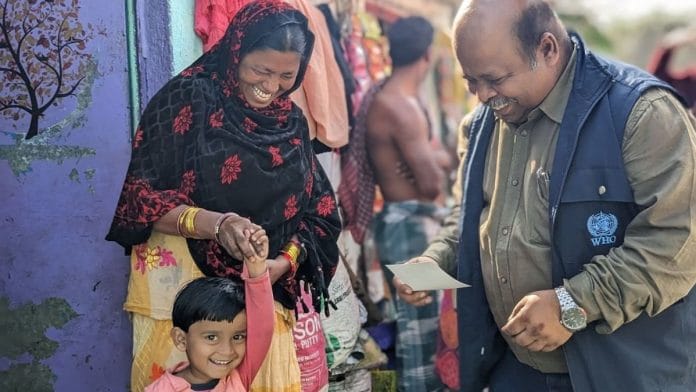New Delhi: India has set a target of eliminating measles and rubella—highly infectious but vaccine-preventable diseases in children that can result in serious illnesses and prove fatal in some cases—by 2026, after missing the target of eliminating them by 2023.
The target to eliminate the diseases was first set by the Union government for 2015, which was later pushed to 2020 but was again revised for 2023 during the Covid-19 pandemic period.
Union Health Minister J. P. Nadda Thursday launched the National Zero Measles-Rubella Elimination Campaign on the occasion of World Immunization Week, calling it an opportunity to achieve 100 percent immunisation coverage to provide high-quality life to children by administering them with two doses of measles and rubella vaccine.
The government has defined measles and rubella elimination as the absence of endemic measles transmission in a defined geographical area for at least 12 months, which has to be verified again after it has been sustained for at least 36 months in the presence of a high-quality surveillance system.
According to the World Health Organization (WHO), measles is a highly contagious, serious airborne disease caused by a virus that can lead to severe complications and death and is a leading cause of childhood mortality among the vaccine-preventable diseases in India.
As per the United States Centers for Disease Control and Prevention (US CDC), which cites data, between September 2024 and March 2025, India reported a total of 7,201 cases of measles—the highest cases globally after Yemen. In 2023, there were an estimated 1,07,500 measles deaths globally, mostly among unvaccinated or under-vaccinated children under the age of five years.
Rubella, also called German measles, while not life-threatening in children, can lead to birth defects when pregnant women are infected.
Under the Centre’s Universal Immunisation Programme (UIP), a vaccine against measles is offered as a combination vaccine, including rubella vaccine (MR), which comes in two shots—the first at nine to 12 months and the second at 16–24 months.
The vaccine against measles also is available as the Mumps-Measles-Rubella (MMR) vaccine in the private sector.
The data showed by the Union Health Ministry Thursday 332 districts in the country reported zero measles cases and 487 districts reported zero rubella cases during January–March 2025—indicating that a high number of districts still recorded the cases.
It also showed that currently, India’s MR vaccination coverage stood at 93.7 percent for the first dose in 2024–25 and at 92.2 percent for the second dose. Also, in 2024, India has recorded a remarkable decline of 73 percent in measles cases and a 17 percent reduction in rubella cases in comparison with 2023.
According to experts, while the case fatality rate due to measles is 1–3 percent, it can be as high as five to 10 percent during an outbreak. The country had reported a major measles outbreak in several states in 2022, mainly on account of massive disruptions in immunisation services in 2020 and 2021.
“As of now, 2026 elimination target for measles and rubella looks like a realistic target but we need a targeted granular plan to take the plan ahead as there is worrisome disparities between states and districts in vaccination coverage,” Dr T. Jacob John, co-chair of the India Expert Advisory Group on Measles & Rubella (IEAG-MR), told ThePrint.
(Edited by Radifah Kabir)
Also Read: In Delhi NCR, new ambulance helpline promises prompt medical response, within 15 min. How it’ll work






